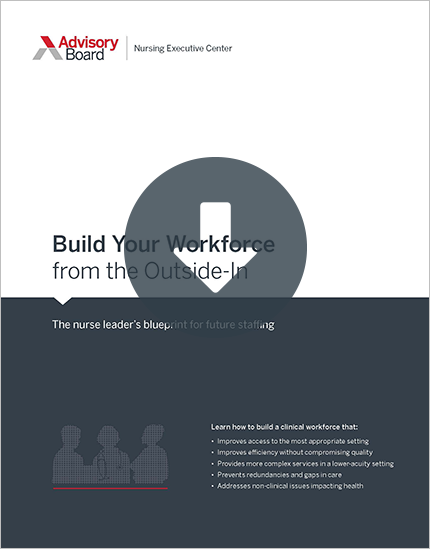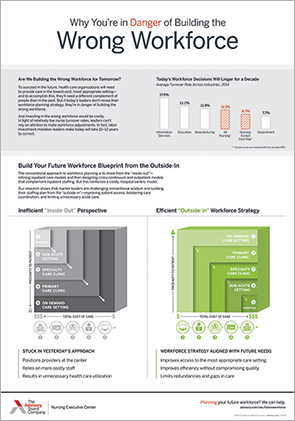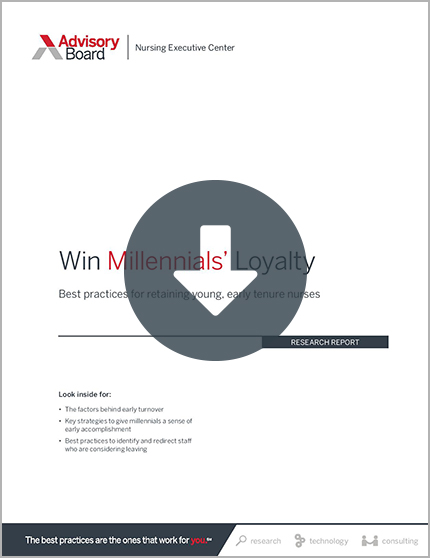Auto logout in seconds.
Continue LogoutEditor's note: This popular story from the Daily Briefing's archives was republished on Oct. 25, 2019.
Nursing is a rapidly growing field that often struggles to recruit and retain male workers—but there may be a way to attract more men to the profession, Shankar Vedantam reports for NPR.
Male nurses are outnumbered 7:1. But they still earn more money, these charts show.
What it's like to be a male nurse
Right now about 10% of nurses are male—a reality that Robert Vaughn, who is a male nurse himself, confronts daily.
From time to time, Vauhgn said, he enters a patient's room and introduces himself as a nurse, only to discover that the patient feels uncomfortable and would prefer a female nurse.
"I find it somewhat hypocritical when … the doctor is male, and it's very intimate. But somehow, as a nurse, I'm male and that's a problem," Vaughn said. "[I]t doesn't make any sense to me. You go, wait a minute, the doctor is a male, too. Somehow you have no issue with him. But as a male nurse, you have an issue."
Patients also sometimes wrongly assume that Vaughn is a doctor rather than a nurse, Vedantam reports.
Why don't some men want to be nurses?
Jennifer Bosson, a psychologist at the University of South Florida who has studied why men often don't engage in activities dominated by women, has a theory about gender stereotypes faced by nurses such as Vaughn. Her team asked almost 200 men and women to write about a time "they violated their gender role in public."
According to Bosson, some of the women talked about being tomboys or working in male-dominated fields—examples that spoke to longstanding confrontations with gender stereotypes. The men, on the other hand, often said things like "'I wore a pink shirt to work.' Or 'I held my girlfriend's purse while she ran into the bank,'" Bosson explained. "Or 'I ordered a drink at a restaurant and when it came out to me, it had a little cocktail umbrella in it.' … So it's like—it's just mundane things."
Boson's takeaway was that "the male gender role itself is kind of conceptualized as a more precarious status," she explained. "So manhood is something that's hard to earn and easy to lose relative to womanhood."
Put another way, men's "social status is more hierarchically organized than women's is," Boson said. "So men are kind of more interested in or motivated to attain social status. And that kind of then translates into what we propose is kind of a chronic anxiety about their status. And that translates into a concern about whether one's seen as a real man or not."
One way to attract more men to nursing: Change the narrative
Bosson said the key to making nursing feel more masculine is to change the way that men conceptualize the job.
Although the nurturing aspects of nursing may be seen as traditionally feminine, Boson noted that other aspects of the role are traditionally masculine. "[Nursing is] dangerous," she said. "It's physically grueling … you could modify that stereotype and turn nursing into a profession that does seem masculine or male appropriate."
For Vaughn, the physicality of nursing helped draw him into the role. Before he became a nurse, he worked as a security guard at a hospital. "We had a couple guys who came into the emergency room, and they were just very belligerent, fighting. And there was blood all over the place," he said.
"And the nurses and us and the sheriffs were holding them down and sedating and restraining and—I was like, man, this is pretty cool. The action that the nurses were seeing was pretty exciting for me" (Vedantam, NPR, 10/2).
Millennial nurses are a third of our workforce—here’s how to retain them
In 2016, millennials surpassed Baby Boomers as the largest living generation in the United States. As more millennials have entered the nursing workforce, health care leaders have confronted a growing challenge: young nurses are turning over at higher rates than their older peers, especially early in their careers.
Use the strategies and best practices in this study to build a millennial-specific retention strategy for your organization.
Don't miss out on the latest Advisory Board insights
Create your free account to access 1 resource, including the latest research and webinars.
Want access without creating an account?
You have 1 free members-only resource remaining this month.
1 free members-only resources remaining
1 free members-only resources remaining
You've reached your limit of free insights
Become a member to access all of Advisory Board's resources, events, and experts
Never miss out on the latest innovative health care content tailored to you.
Benefits include:
You've reached your limit of free insights
Become a member to access all of Advisory Board's resources, events, and experts
Never miss out on the latest innovative health care content tailored to you.
Benefits include:
This content is available through your Curated Research partnership with Advisory Board. Click on ‘view this resource’ to read the full piece
Email ask@advisory.com to learn more
Click on ‘Become a Member’ to learn about the benefits of a Full-Access partnership with Advisory Board
Never miss out on the latest innovative health care content tailored to you.
Benefits Include:
This is for members only. Learn more.
Click on ‘Become a Member’ to learn about the benefits of a Full-Access partnership with Advisory Board
Never miss out on the latest innovative health care content tailored to you.



